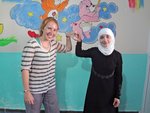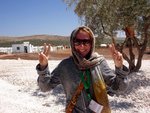 Severna Park
Severna ParkFair, 62°
Wind: 4.6 mph, N
 Severna Park
Severna Park



The quiet Severna Park neighborhood where Jon and Maria Ulbricht live feels worlds away from the war-torn, Syrian-Turkish border where their eldest daughter, Bailey, has made numerous trips to provide assistance to refugees fleeing Syria. Outside the Ulbricht’s kitchen window, there’s an abundance of greenery, and a peaceful hush hangs over the neighborhood of stately brick houses on the secluded suburban street.
So how is it that Bailey — a 22-year-old graduate of Carleton College with a major in international relations — wound up living halfway around the globe, dedicating her time and energy to alleviating the plight of Syrian refugees?
“She’s always been kind of a wild child,” Jon said. “She’s just a very passionate person.”
It’s no secret Maria and Jon admire and approve of the work their daughter is doing on behalf of one of the most beleaguered groups in the world today, despite the personal risks involved.
“She’s so passionate about it,” Maria explained. “It was easy to support her because we could tell how much she loved doing it.”
Maria and Jon detailed Bailey’s various trips to Turkey. There was an initial trip in the summer of 2013, when Bailey worked for eight weeks with refugee children at an educational center in Reyhanli (a dry, hot Turkish town 1 kilometer from the Syrian border), keeping the kids’ spirits afloat with English classes, playground games and classroom art projects. Then, there was a second sojourn, shorter this time, consisting of three weeks in December 2014 when Bailey spent time in Reyhanli and the city of Antakya, conducting a series of interviews as part of field research for her senior thesis.
Upon her return to the states, Bailey applied for a Davis Peace Prize Scholarship and procured a $10,000 grant that enabled her to return to the region and breathe new life into a dilapidated test prep center in Antakya. There, she created a computer lab, brought in projectors and taught advanced classes for the TOEFL (Test Of English as a Foreign Language). A portion of the Davis Peace Prize grant went toward bankrolling the test fees of 15 lucky students who wouldn’t otherwise have been able to afford the $185 TOEFL entrance fee (a prohibitively high amount of money for most refugees, who barely have enough to eat).
Maria and Jon said that Bailey is already back in Turkey on her fourth extended stay. This time, it’s a nine-month stint on a Fulbright scholarship, and she’s teaching English in a Turkish university.
“Each subsequent experience has kind of moved her toward compassion for humanity in general,” Jon relayed. “But she’s focused on these people right now, because she’s actually there, you know, she’s living it.”
Although a good portion of Bailey’s contribution to the war-torn area has been in an academic capacity, there’s nothing abstract or erudite about her alliances with the people she serves. “There’s a family who has taken her in — and as their own — and these are people who are Syrian, who have been displaced from their homes and have barely anything, and they’ve given her everything they have.” Maria said. “[Jon and I] both get tears in our eyes.”
During her first trip to Reyhanli, Bailey (then age 20) became fast friends with many Syrians her own age who’d always dreamed of going to college but had to delay their educations when the war broke out, toppling the country’s infrastructure and making attending school an impossibility. Bailey found that many of her Syrian peers were keen to learn English but lacked basic resources and teachers. So she stepped up, offering her friends impromptu tutorials in English in her spare time, at first in person, and then via Skype upon her return to the states. Soon, word about Bailey’s cyber-tutorials spread, and more and more people sought her help.
Now that she is in her junior year at Carleton, there was no way Bailey could tutor them all. Not a person to turn anyone away, she decided to recruit fellow students in the United States to help her shoulder the load. Before long, she found herself at the head of an entire English language learning program taking place in real-time in cyberspace — and a new nonprofit, Paper Airplanes Tutoring, was born.
The unprecedented program has a profoundly positive impact on not only an academic level but a personal one as well. Friendships between U.S. and Syrian students have flourished, and cultural gaps have been bridged. Burgeoning cross-cultural awareness, mutual respect and good old-fashioned camaraderie are just a few of the valuable byproducts fostered in the learning exchange.
Since those beginning days in the spring of 2014, Paper Airplanes Tutoring has partnered with Students Organize for Syria (SOS), and engages tutors from more than 20 U.S. colleges, as well a handful of universities in Canada, Moscow, France and India.
To date, Turkey has taken in close to 2 million Syrian refugees fleeing the escalating violence of the civil war. Education will be a key factor in the next generation’s concerted effort to rebuild Syria and, in the implementation of democratic reforms in particular, once the Assad regime loses its traction in the region. The Skype tutorials provided by Paper Airplanes are nothing less than crucial to a generation of Syrians hoping to resume their education and get back on track after an extended period of war and atrocity. Put simply, the program offers a beacon of hope where once there was none.
Jon summed up Bailey’s mission in so many words. “She’s targeted education as the future for these people to rebuild their lives,” he said.
Bailey started Paper Airplanes on a shoestring and now it’s going strong. “This week, we have 60 Syrian students looking to get tutored,” Bailey explained via Skype in late September. “Hopefully, we’ll be able to match all of them (to tutors) by the end of next week … The program has really grown. The goal is to provide Syrian students with basic English assistance through Skype to help them take the TOEFL exam, which can be used both to apply to university abroad, or to get a job.”
Why was she drawn to Turkey and Syria, specifically?
“I was captivated by the Arab spring, as I think a lot of people were,” Bailey explained. “I was fascinated to remember a narrative I’d heard most of my life about what the Middle East was — supposedly a place of violence and harboring terrorists — and then I suddenly saw just like millions and millions of people across this region calling for freedom and democracy, things that the American identity is founded on in a lot of ways, and I was absolutely fascinated.”
Bailey started learning Arabic, took college classes focusing on the Middle East and grew more and more interested in the Syrian uprising as she watched the news on TV, horrified by the brutality of the government response to the protestors challenging the dictatorial Assad regime. For her, it brought up ethical questions relating to U.S. foreign policy and involvement — what was the United States’ obligation in the matter? As the situation worsened and much of the world shrugged and turned a blind eye, Bailey found it difficult to stand by passively.
Recalling the day she reached a turning point, Bailey said, “I was reading a New York Times article about what was happening [in Syria], and I was like, ‘What’s the purpose of this article if I’m just going to sit here and keep reading? I have go, I have to help.’”
She emailed more than 60 organizations and brought a Syrian expat to talk at her university. After the man’s presentation, she “basically begged him” whether he knew any organizations that would take her as a volunteer. Before she knew it, she was teaching the English alphabet to a posse of refugee kids at the educational center in Reyhanli. That’s passion for you.
“I’m an avid learner,” Bailey explained. “I love to learn things, but ultimately, I think that knowledge is only power if you can use it. I guess that’s why I like to learn, so that I can better help people.”
Bailey conceded that her parents, Maria and Jon, have had an enormous influence on her outlook, instilling humanitarian leanings in her from an early age.
“They would always tell me to follow my heart and act on my passion,” Bailey said. “So that’s sort of how I learned to operate.”
For more information about Paper Airplanes Tutoring, go to www.paper-airplanes.org or email Bailey Ulbricht directly at ulbricht.bailey@gmail.com.
Comments
No comments on this item Please log in to comment by clicking here